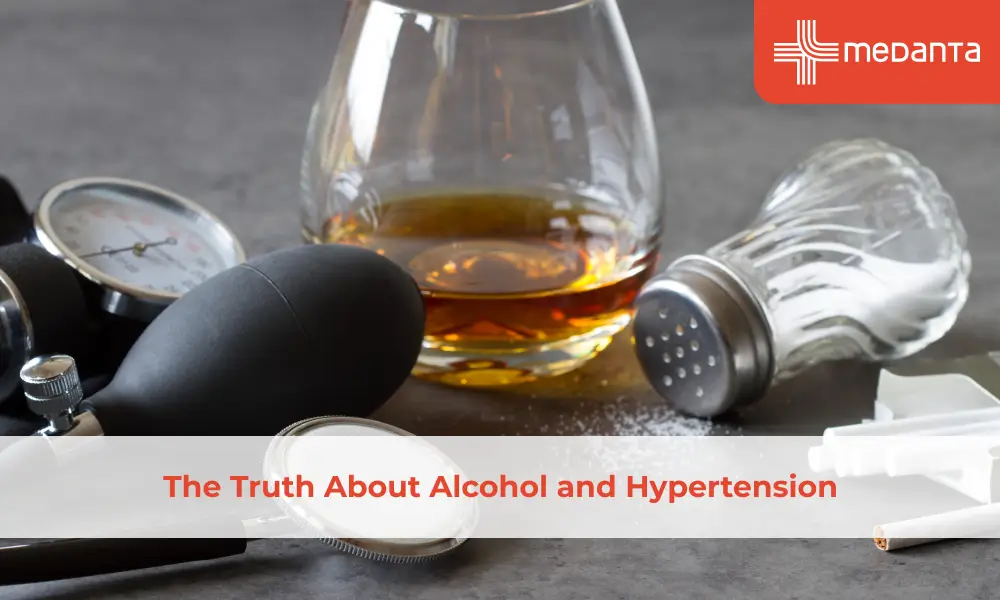The Truth About Alcohol and Hypertension

Hypertension is called a lifestyle disease for a reason. This syndrome has become a common sight in our “work hard-party hard” generation which is of the belief that high risks yield high rewards - without considering the dire implications such a lifestyle can have on one's physical well-being.
Alcohol, for example, is a commonly used stress reliever that could be doing more harm than good to you in the long run and possibly be the cause for lifestyle diseases like Hypertension. Read on to know more about alcohol’s complicated relationship with hypertension and learn how you can make a smarter choice the next time you reach for a drink:
Does drinking alcohol in moderation really make for a healthier heart?
People often quote new studies that cite the supposed medical benefits of alcohol to legitimize drinking habits. The truth of the matter, however, is more nuanced.
The link between alcohol and hypertension has been a matter for study for hundreds of years, beginning from the writings of French physicians like Lian who in the 1900’s wrote about how sailors who consumed several litres of wine regularly were found to suffer from hypertension.
Modern studies have since moved on to study the positive effects of alcohol by analysing the circulatory benefits of polyphenols (present in red wine) on the human heart. The larger takeaway is that excessive intake of alcohol can, in fact, result in a host of adverse psychosocial and health consequences like hypertension and that its perceived benefits are usually due to ancillary lifestyle benefits that are unrelated to its consumption.
Understanding The Health “Benefits” Of Red Wine
Some of the health benefits associated with Red Wine including lower risk of heart disease, reduced inflammation and cancer, as well as extended lifespan. Unfortunately, red wine as a miracle drink for heart health is largely a myth. The linkage reported in many of these studies may be due to other lifestyle factors like low salt diets, optimal weight, and exercise rather than wine.
The Science Of Red Wine
Grapes are naturally rich in many antioxidants like resveratrol and proanthocyanidins that are believed to be responsible for the supposed health benefits of red wine. Resveratrol is an antioxidant has been linked to benefits that could technically reduce the risk of heart disease. However, the resveratrol content in red wine is too low to achieve any tangible health benefits and would require consumption in the excess of a few bottles to achieve said benefits. (Not something we recommend!)
You also need to determine your lifestyle and genetic risk factors as a lot of people shouldn’t drink at all for reasons like family history of alcoholism or heart or liver disease.
The big takeaway here is that a glass of red wine (for women) or up to two (for men) per day could be fine if you don't have any hereditary issues. But, the associated health benefits don't justify regular consumption as the alcohol in the wine weakens any antioxidant benefit.
Can Excess Alcohol Affect Your Blood Pressure (BP)?
Drinking too much alcohol can raise your blood pressure. The higher the alcohol intake the higher the BP. Consuming three or more drinks of alcohol per day approximately doubles the risk of hypertension. This relationship usually persists even when other factors are considered, such as age, weight (or body mass index), sodium and potassium intake, cigarette smoking, and education. Your doctor may recommend that you decrease your alcohol consumption if you have been diagnosed with Hypertension or HBP.
A Word Of Caution
Here are a few things you need to be mindful of the next time you consume alcohol.
Binge drinking is never a good idea. Avoid having more than three drinks in one sitting as this can dangerously raise your blood pressure.
This regulation of alcohol consumption is especially important if you suffer from hypertension and it can help to lower your BP by a few millimetres. (Systolic: 2-4 mm/Hg, Diastolic 1-2 mm Hg).
Avoid consuming Alcohol if you are on hypertension medication as it can lead to dangerous side effects.
It has been found that the hypertensive effect of alcohol usually subsides within several days of abstention. The relationship between alcohol intake and BP is strongest for alcohol consumed within the previous 24 hours.
Alcohol consumption can also lead you to put on weight and increase your risk of high blood pressure.
The Bottom Line
The bottom line is that having more than two drinks in a day can elevate your blood pressure and also lead to dangerous complications like strokes in the long run. Our recommendation is that men should stick to no more than two drinks a day until the age of 65, after which it should drop to one drink a day (one drink roughly translates to 355 Ml of Beer, 148 Ml of Wine or 44 millimetres of Distilled spirits). Whereas, women of any age should have no more than one drink per day.
Moderation is key when it comes to the consumption of alcohol. You need to have an open dialogue about your alcohol consumption when you talk to your doctor.






